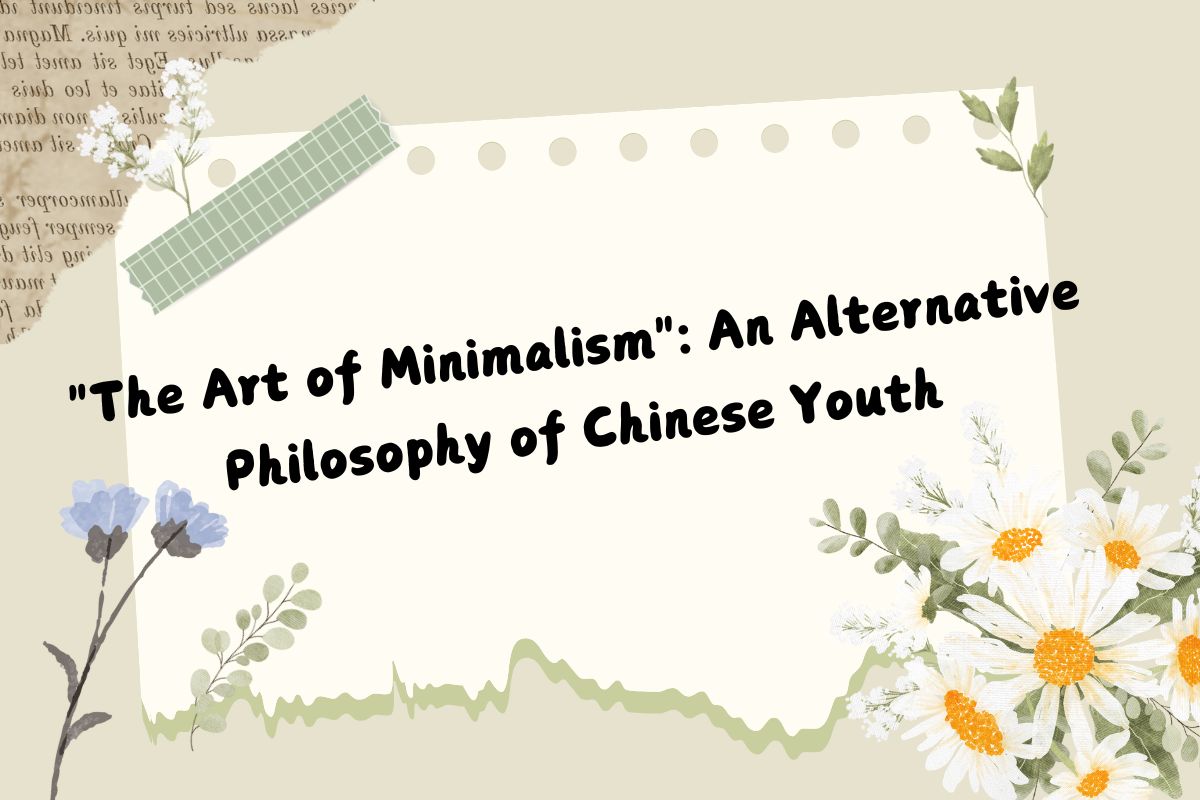"The Art of Minimalism": An Alternative Philosophy of Chinese Youth
Have you ever hesitated about discarding some old items while tidying up your room or packing your luggage? You may feel reluctant to throw them away, yet find them useless, resulting in an accumulation of many old items in your living space. Perhaps, you should explore the recent rise of the minimalist lifestyle philosophy in China. In today's China, this new trend is quietly emerging among the younger generation, and this article will share with you, offering valuable insights.

"断舍离" or the impeccable philosophy of life was initially proposed by the Japanese guru of decluttering, Marie Kondo! At its core lies a grand 'slimming down' of life, where '断' (duàn) acts as a resolute guardian, keeping unnecessary things out; '舍' (shě) resembles a relentless purging master, sweeping away all excess; while '离' (lí) works as a magical spell that helps us break free from the grasp of material possessions, preventing us from being led astray by external attachments.

In China, young people have begun to evaluate the possessions they own, retaining only those that truly serve a purpose and hold meaning意义(yì yì) for themselves.
意义 (yì yì), noun, meaning
Examples:
- The meaning of this word is difficult to understand.
这个词的意义很难理解。
zhè gè cí de yì yì hěn nán lǐ jiě 。 - What is the meaning of life?
生命的意义是什么?
shēng mìng de yì yì shì shén me ?
When sorting through their clothes, for instance, they will unhesitatingly pull out those items that have been sitting idle in the closet for years, either ill-fitting or outdated, and promptly donate them or toss them in the bin, keeping only those classic staples they cherish and love to wear repeatedly.
When purchasing new items, they no longer rush into impulsive buying as before, but carefully consider the quality and utility of each product. Through this process of decluttering清理(qīng lǐ) on a material level, living spaces instantly transform into chic, minimalist showrooms, and the stress and anxiety caused by piles of possessions vanish into thin air as if by magic.
清理 (qīng lǐ), noun, decluttering
Examples:
- Decluttering your home can make you feel more relaxed.
清理你的家可以让你感觉更放松。
qīng lǐ nǐ de jiā kě yǐ ràng nǐ gǎn jué gèng fàng sōng 。 - The process of decluttering requires patience.
清理的过程需要耐心。
qīng lǐ de guò chéng xū yào nài xīn 。
The advancement of the internet has led to an explosion of information, posing a significant challenge for modern individuals. Young people recognize that excessive irrelevant information can consume their time and energy, affecting the clarity of their thoughts.
As a result, they have begun to filter and sift through various types of information, unfollowing meaningless public accounts, uninstalling infrequently used mobile applications, retaining only high-quality information sources relevant to their interests, work, and studies.

On social media platforms, they no longer indulge in mindless scrolling and idle chatter but focus more on valuable content creation and interaction. Through this information-based decluttering, young people can better concentrate on important matters, enhancing their learning and work efficiency.
Moreover, many young individuals today no longer pursue superficial connections but prioritize deep communication and emotional bonds with close friends and family. They actively distance themselves from individuals who bring negative emotions or ineffective social interactions, allocating their time and energy to genuine friendships.
Simultaneously, they cherish the time spent with family, enhancing their relationships through various means. This social decluttering allows relationships to become more pure and profound, offering a sense of peace and beauty.

Interestingly, this seemingly modern philosophy finds deep roots in traditional Chinese culture as well. The eminent Chinese master, Wang Guowei, once expressed in his classic work "Renjian Cihua": "The inanimate objects all have emotions, and emotions are all intertwined. Why complicate one's life during their time on earth?"
From these words, we can readily discern his profound insight into the imperceptible yet authentic emotional bond between humans and objects.
In daily life, people tend to establish various connections with numerous possessions, however, when these relationships become excessively complex and redundant, they can easily lead to a state of mental turmoil, gradually causing individuals to lose sight of their true selves.
It is precisely for this reason that Wang Guowei has put forward a series of profoundly wise suggestions. He advocates for embracing an attitude of "few desires and contentment," not allowing endless desires to drive oneself but understanding the importance of being satisfied with what one already has.

Efforts should be made to "not be enslaved by material possessions," avoiding becoming a slave to materialism, being controlled and restrained by material items; one must always adhere to the pursuit of "valorizing tranquility," maintaining inner peace and calm amidst the hustle and bustle of the world; and to uphold the aesthetic concept of "simplification as beauty." Whether in lifestyle or spiritual realm, simplicity is sought over complexity.
Perhaps, this is where the allure of decluttering lies. When we practice decluttering in our busy lives, we return to the tranquility and authenticity of our inner selves, embracing a life with more texture and depth. I hope after reading this article, you too can find balance and happiness in this complex and intricate world.